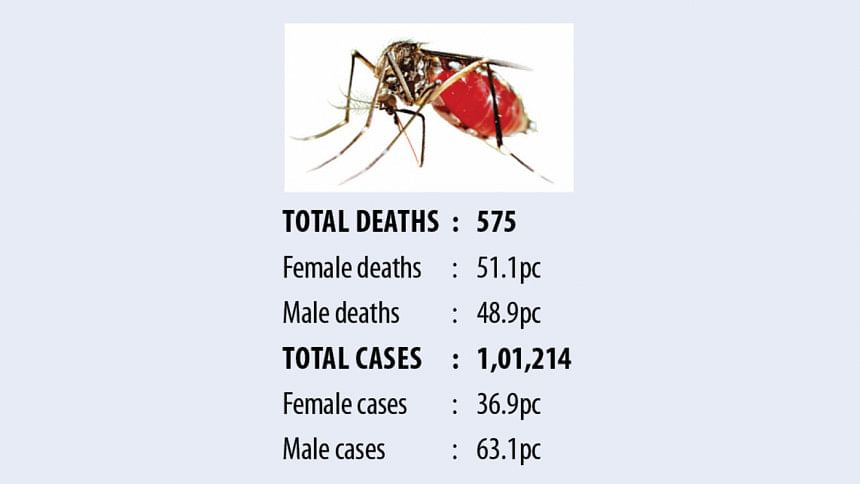2024: continued struggle against dengue

The year 2023 was one of dengue devastation, breaking all previous records. As the new year approached, there was much discussion about improving the situation. However, it turned out to be all talk and no show, as dengue still claimed hundreds of lives in 2024.
In terms of fatalities, this year recorded the second-highest death toll, with at least 575 lives lost, coming second only to 2023. The number of cases ranked as the third-highest to date, with 1,01,214 new cases. Most of the deaths were recorded in Dhaka.
In 2023, a record 1,705 deaths and 3,21,179 cases were recorded. Experts had called for urgent, year-round measures, but 2024 proved those warnings went largely unheeded.
TOLL IN NUMBERS
Among this year's fatalities, 51.1 percent were female and 48.9 percent male. Hospitalisation data revealed that 63.1 percent of patients were male, while 36.9 percent were female. Health professionals linked the high mortality rate to severe complications like multi-organ failure, shock syndrome, and delayed hospitalisation, often exacerbated by pre-existing conditions.
Dr HM Nazmul Ahsan, associate professor at Shaheed Suhrawardy Medical College Hospital, explained that many patients arrived at hospitals in critical condition. "Shock syndrome following fever often led to multi-organ failure. Persistent shock typically causes liver damage, followed by kidney failure, leaving patients with little chance of survival," he said.
Patients with comorbidities such as diabetes, hypertension, or chronic lung diseases were particularly vulnerable, with delayed treatment compounding their risks.
Dr Tahmina Shirin, director of the Institute of Epidemiology, Disease Control and Research, said 70 percent of fatalities this year were caused by the Dengue Den-2 virus, which is linked to more severe outcomes.
WHY THE NUMBERS REMAIN HIGH
Experts blame irregular anti-mosquito campaigns for this year's high numbers, a situation exacerbated by a vacuum in local government leadership.
Following the fall of the Awami League government in August 2024, 12 city corporation mayors, 330 municipality mayors, and numerous zilla and upazila parishad chairpersons were removed. Their absence led to disrupted mosquito control efforts, as interim administrators struggled to implement effective measures.
Climate change also played a significant role.
Warmer, more humid conditions extended the breeding season of Aedes mosquitoes.
Entomologist Manzur A Chowdhury explained that the ideal temperature range for Aedes mosquito activity is between 16°C and 30°C, conditions that persisted well into November. Rainfall patterns have also shifted, contributing to year-round mosquito breeding.
Professor Kabirul Bashar of Jahangirnagar University said, "Extended rainy seasons and altered humidity levels have enabled Aedes mosquitoes to adapt, changing their seasonal dynamics," he said.
A CALL FOR ACTION
As Bangladesh enters another year with dengue looming large, experts have stressed the need for proactive, comprehensive measures. Waiting until the monsoon season is no longer an option.
"Anti-mosquito drives must begin as early as January," said Manzur A Chowdhury.
"Identifying hotspots and implementing targeted interventions like larviciding, adulticiding, and public awareness campaigns are essential."
Manzur also emphasised integrating surveillance for other mosquito-borne diseases like chikungunya and Zika into broader control strategies to prevent overlapping outbreaks.
Professor Kabirul Bashar underscored the importance of expanding mosquito control efforts beyond Dhaka. "Districts like Barishal, Chandpur, Manikganj, and Gazipur are likely to see rising cases next year. The government must act swiftly," he warned.
Experts also advocated better protection for hospitalised patients and public education campaigns to help citizens recognise warning signs, such as severe abdominal pain, breathing difficulties, or reduced urination.
A sustained, year-round approach is essential to avoid repeating this year's tragic toll in the future, experts said.

 For all latest news, follow The Daily Star's Google News channel.
For all latest news, follow The Daily Star's Google News channel. 



Comments